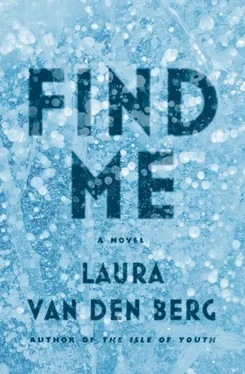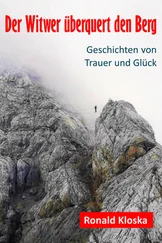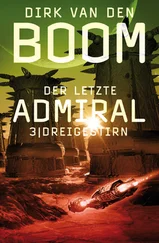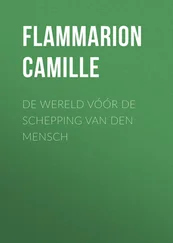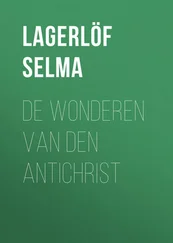In Georgia, in Valdosta, they pull in to a rest stop. They get out and stand in the center of the parking lot, on a mound of brown grass, and sing. Marcus and I watch from the bus windows and I remember the first pilgrims who came to the Hospital, the sound of their voices rising up to our floor. The air is blue with dusk.
At night, back on the bus, they keep singing. They clap and stomp. Even the driver rocks in his seat. They sing “Let the Praise Begin.” They sing “If God Is Dead.” The bus windows are cracked open. I smell exhaust. It is a relief to know there are people out there who will always choose living.
I turn to Marcus. I put his hands on my stomach and ask him to tell me what he feels.
At first, Florida is a kingdom of green. We pass through the forests of Tallahassee, the trees draped with moss, and the gentle hills of Ocala. In the center of the state, the land flattens and we settle into another network of gray highways. I don’t sleep. We drive through the darkness and I count the headlights of the other cars and wonder what all these people are searching for.
In Miami, the dawn sky is dramatic, with rafts of enormous pink-bellied clouds. Do clouds ever die? It seems like clouds must get to live forever.
A list of things that must get to live forever: clouds, volcanoes, fossils, certain insects, the sea.
The bus weaves through the shadows of skyscrapers and crosses a drawbridge with tiny limestone guard towers. A canal runs under the bridge, the water a brilliant green. A tugboat called The Jean Ruth slips under the bridge and putters out toward the Atlantic. The colors of Miami are nothing like the colors of the other places we have been. They are lime, they are butter yellow, they are citrus orange, they are candy pink. A shade of blue that is like the most beautiful clear sky. I imagine my mother living inside this landscape of color. I see her as a silhouette on a balcony, a figure on a bridge, a body on a boat deck turning to face the sun.
The singers have taken us as far as they can. At the bus station, across the street from a strip mall, we learn the next bus to Key West isn’t leaving for six hours. The day is ours. We are dazed by the new colors and the heat and the palm trees, the leaves long and fringed, and the fat iguanas dragging themselves across the sidewalk. What is this place? We’ve never seen anything like it before.
“It’s a girl,” Marcus told me on the bus.
In the night, I started another letter to my mother. I’ve been collecting scraps of paper, carrying around the pen I pinched from a gas station in South Carolina, in Troy. I want so badly to tell her about my life, about the kind of person I am becoming.
We go over to the strip mall and peer inside the windows. One plain face and one rabbit face stare back. Everything is closed. In a store, we see a group of mannequins jumbled together on the floor. Their heads are arranged at strange, deadly angles, their limbs twisted together. I want to set these mannequins right, to free them of each other, but the door is locked and we have to keep walking.
We pass an empty parking lot with a small pearl-colored carousel, the kind of thing you’d see at a fair, languishing in a black pool. We climb onto the carousel and stroke the five white horses with gold saddles. Their nostrils are pink and flared, their eyes wide and afraid. There there, I think, petting a muzzle. The sixth horse is missing from its station. I imagine someone carrying it away on their shoulders and another person watching from a distance, unable to see the human body holding the creature up. They only see the white horse with the rich gold saddle riding into the city and believe themselves to be in the presence of magic. They are wrong, this theoretical person, but they will believe it anyway.
We follow a broad sidewalk that leads us deeper into the city. We pass a church made of yellow stone with a pair of blue archways, a white cross perched on the roof. A group of young people are standing under the arches. They come over and offer us little paper cups filled with apple juice, which we are in no position to refuse. We drink the juice in a single swallow. They want us to come into the church and watch a video. They tell us there is more apple juice inside.
In a small, dark room in the back of the church, we sit on a carpeted floor and watch their video. The video tells us the sickness was just a test, a way for God to find the true believers. There is another sickness coming and this time it won’t be a test. It will not burn out. There will be no recovery. Only those on the side of God will be saved.
God is watching, the video tells us. God is seeing everything.
There are clips of the sickness and preachers preaching the Word and people collapsing into prayer, into the ecstasy of salvation. Somewhere inside the church incense is burning. I watch these preachers chant and sweat. I watch the life fire up inside them and wonder how many are still among the living.
I was never supposed to make it this far. I was never supposed to make it out of childhood. Out of Kansas.
Fuck all of you, I can’t help but think. I outlived you all.
When the video ends, the young people want us to stay and talk. They want us to tell them how we feel about what we’ve just seen, but they have no more apple juice and so it’s time for us to go. These poor young people, I think as we wave good-bye. They have no idea who anyone really is.
I’m still a young person too, I know that, but I don’t think I will ever again feel young.
From Miami, the bus follows Highway 1 until we are just riding a thin strip of concrete extending across the Atlantic, until we are surrounded by ocean. The sky is knotted with cloud. We see the hulking silhouettes of cargo ships. It rains again and the water around us turns dark and roiling. The bus shakes on the highway. I keep working on the letter to my mother.
The bus driver has the radio turned up and I catch something about more snow where there is not supposed to be snow and E. coli in a New Hampshire town’s water supply and fires on the plains of Nebraska that can’t be put out, because no one can identify the source.
Ghost fires.
I have started to think of the sickness not as a single, contained catastrophe, but as part of a series of waves. We are still burning. What will be the wave that puts us out? I feel the heat of my mother’s photo in my pocket and try not to think about what might be coming next.
Marcus is no longer wearing his mask. The scarred skin around the damaged eye looks like melted wax. He left the mask in Miami, the rabbit face floating in the water. I didn’t ask him to explain. I know what it’s like to want to leave part of yourself behind.
I am shedding too. I left the gardening gloves on the choir bus. I don’t need them anymore, now that we are away from the cold.
In Key West, the palm trees are storm-battered. Green fronds have gone missing, bark tongues flop away from trunks. The ocean is clearer and I can see dark masses of seaweed floating in the water like continents. The beach is not a smooth white crescent like the one in Miami, but a narrow sandy strip, rough with broken shells and driftwood, guarded by a concrete seawall.
We pass a graveyard with stone mausoleums sitting on the grass like little houses. A row of folding chairs and a tent are set up in one corner of the graveyard, the mark of a service that has already happened or has yet to begin.
We pass the Key West weather station, an L-shaped concrete building with a radar dish. I imagine people scurrying around inside, going crazy trying to keep up with the changes in the atmosphere. We pass a museum devoted to shipwrecks. I wonder if any of my mother’s finds are in there. I picture us standing on the decks of wrecked ships, climbing the lookouts, crawling through the cool dark of the hulls. We pass an elementary school painted with red hibiscuses, houses standing on cinder blocks, houses surrounded by faded picket fences that make me think of shark’s teeth, a house with a tree growing through the roof, the thin branches twisted together and dripping with brown, hair-like moss. We pass a Laundromat where all the dryer doors are hanging open like mouths awaiting permission to speak.
Читать дальше
